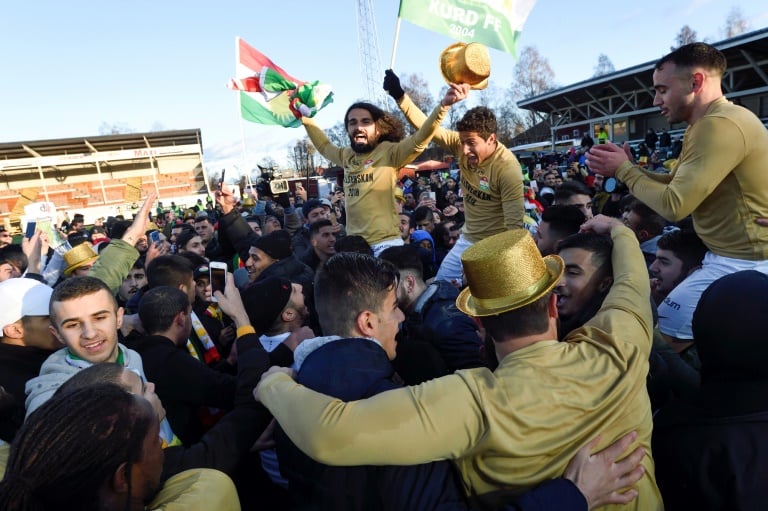Real Madrid coach Ancelotti tax fraud trial set to begin
Scores of cheering fans ran onto the pitch, dancing and waving Kurdish flags last week when Dalkurd FF beat Gothenburg’s GAIS 1-0 to earn a seat in next season’s Allsvenskan.
Midfielder Rawez Lawan, 30, hit the only goal 59 minutes into the game at the Domnarvsvallen Stadium in the central Swedish city of Borlange on October 28.
“Millions of Kurds are dancing with joy… it’s so wonderful to give them this happiness,” Lawan told TT news agency after the match.
“This means more than just football.”
Dalkurd’s victory lifted spirits among Kurds disheartened by the continued violence in Kurdish populated areas of Turkey and the aftermath of the controversial independence referendum in Iraq’s autonomous Kurdish region.
“I was very happy when I saw their great results,” Ahmed Karim, a 35-year-old resident in Arbil, the capital of autonomous Iraqi Kurdistan, told AFP.

Supporters and players of Dalkurd FF, the Swedish football team founded by Kurdish immigrants, celebrate on the pitch after defeating Gothenburg’s GAIS in a Superettan (Swedish second division) match and winning promotion to the top division
The Kurds are a non-Arab ethnic group numbering between 25 and 35 million spread across four countries — southeast Turkey, northern Syria, Iraq and Iran — without a recognised state of their own.
“I hope they will represent Kurdish sport globally, because we in the Middle East do not have our own Kurdish (national) team,” Karim added.
The fallout from last month’s vote caused weeks of armed clashes in which Baghdad reasserted control over swathes of oil-rich Kurdish-held territory and triggered the region’s president Massud Barzani to step down.
Arslan Abdallah, a sports journalist at the Kurdish Rudaw television channel based in Arbil, said the team’s success is “a huge victory for Kurdish athletes in Europe” and in his region.
– ‘Driven by pressure’-
The remarkable rise of the squad, which includes Americans, a Palestinian and a Gambian, is built on their defiant personalities, according to their assistant coach Amir Azrafshan.
“They all have something in common when it comes to enjoying a challenge… they’re driven by pressure,” he told AFP.
The club was formed in 2004 in the central Swedish province of Dalarna, around 300 kilometres northwest of Stockholm, as a social project to help troubled youth integrate into society.
It “gives hope to us immigrants in Sweden that we can succeed,” author and social commentator Kurdo Baksi said.
Swedish daily Aftonbladet reported in February 2016 that 49 percent of the club was bought by the two Kurdish “billionaire brothers” Kawa and Sarkat Junad.
“We want to win and be in the highest division as quickly as possible. I would love to see Dalkurd in the Champions League,” Sarkat Junad told Aftonbladet at the time.
– ‘No friends but the mountains’ –
With more than 1.5 million followers on Facebook, the club has become a symbol for Swedish and Kurdish cohesion.
Its logo is a football-shaped version of the Kurdish flag in red, white and green with a yellow star, but with the addition of two horses, a reference to the traditional carved and painted wooden horses of Dalarna.
“Sweden gave us the possibility to feel freedom and receive an education that we didn’t have in our (country of origin),” the club’s chairman Ramazan Kizil said.
“We’ve been given a lot and we will give it back to this society,” he added.
Dalarna means “dales” in English and the name refers to the breathtaking valleys of the region.
The Kurd’s, whose mountainous home region covers almost half a million square kilometres (200,000 square miles) in the Middle East, have a saying that they have “no friends but the mountains”.
“It’s not a coincidence that the Kurds have left their mountains and ended up in the valleys of Sweden,” Baksi said.
Download our app